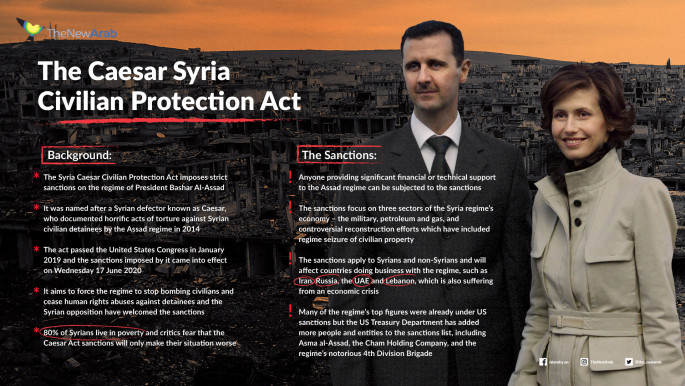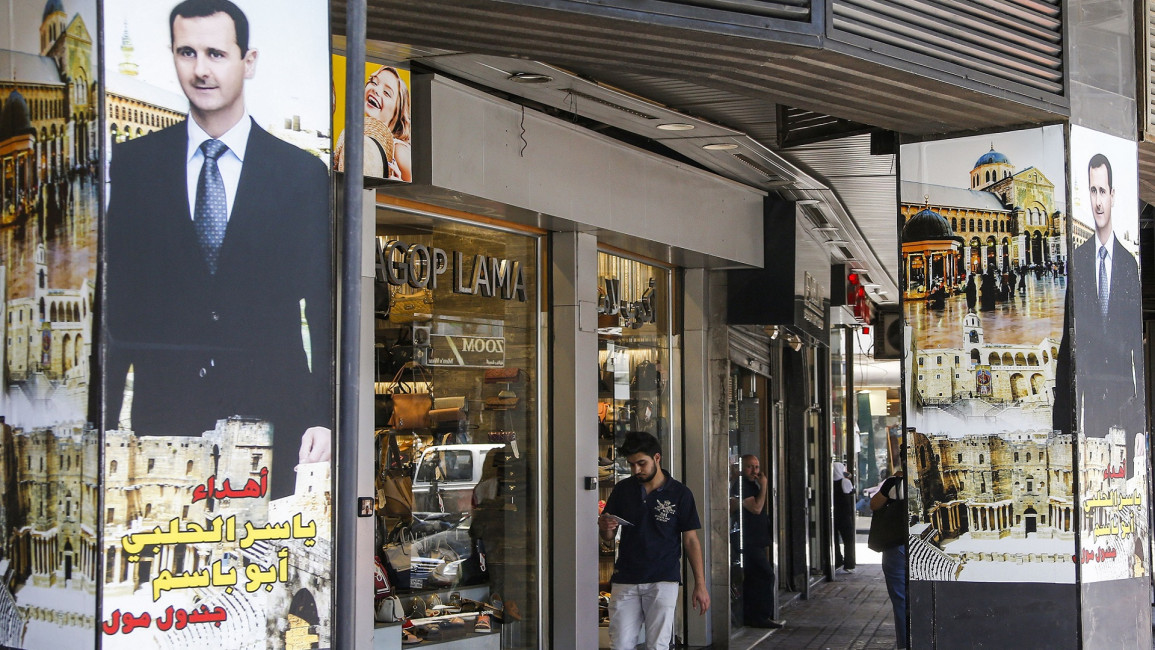Explainer: Who are the Syrian regime figures on the US’s Caesar blacklist?
Sanctions passed under the US' Caesar Syria Civilian Protection Act of 2019 came into force on Wednesday, putting unprecedented pressure on Bashar al-Assad's regime. The declared aim of the sanctions is to "halt the wholesale slaughter of the Syrian people, encourage a negotiated political settlement and hold Syrian human rights abusers accountable for their crimes".
The sanctions target anyone providing significant technical and financial support to the regime, leading to its further isolation from the rest of the world.
The Assad regime claimed that the sanctions will significantly harm the Syrian economy at a time when Syria is already in the midst of a severe economic crisis. The US, however, insists that the sanctions only target the regime not the Syrian people. The Syrian opposition has welcomed them, saying that they will force Assad to negotiate a political settlement and decrease its ability to commit further atrocities in the country, after being held responsible for the bulk of the Syria war's 500,000 deaths - the majority from the indiscriminate regime bombing of towns and cities.
Many of the regime’s senior figures and entities, including Bashar al-Assad himself, his brother Maher, and the notorious 4th Division were already under US sanctions. On Wednesday, the US Treasury Department published a list of individuals and entities targeted by the sanctions, which included new names.
Some have been in the media limelight before but others are secretive and little-known. In this piece, The New Arab looks at a few of the regime figures hit by the Caesar Act sanctions.
Asma al-Assad: Perhaps the most well-known figure among the newly sanctioned individuals, Bashar al-Assad’s UK-born wife Asma has been used by the regime to present a modern, sophisticated face to the world. In February 2011, a fluff-piece in Vogue magazine, entitled "A Rose in the Desert", praised her elegance and the way she ran her household on "wildly democratic principles". The article was deleted by the magazine after the regime's brutal suppression of peaceful pro-democracy protesters began in March that year.
A former investment banker, Asma has supported her husband throughout the Syrian uprising and conflict. Emails leaked in 2012 revealed that she was spending tens of thousands of dollars on designer clothes and luxury furniture while the regime was brutally cracking down on civilians and imposing starvation sieges on opposition towns and cities.
After the backlash against her started in 2011, Asma kept a relatively low profile for a time but then tried to present herself as a charitable figure. She controls the Syria Trust for Development, which the Middle East Institute describes as "a vast charity network she founded as first lady of Syria in 2001 when no NGOs were permitted to operate, giving it a clear monopoly".
After recovering from breast cancer in August 2019, she played a key role in Bashar al-Assad’s conflict with his cousin, Rami Makhlouf, who until recently controlled a vast business empire in Syria. She established a new telecommunications company set to take over the monopoly Makhlouf held on Syria's mobile phone services.
Bushra al-Assad: Bashar al-Assad’s older sister was previously married to Assif Shawkat, the former head of Syrian Military Intelligence who was killed in an explosion in Damascus in August 2012 along with Defence Minister Dawoud Rajiha other top regime military officials. While two Syrian rebel groups claimed responsibility for the bombing that killed her husband, there have been a lot of questions about the ability of the opposition to target such high-level figures. In 2016, The Daily Beast quoted diplomatic and intelligence sources saying that Iran and Assad organised the assassination because Shawkat and Rajiha wanted to pursue a relatively moderate policy regarding the Syrian uprising.
|
|
Bushra left Syria for Dubai in 2012 and has lived there, quietly, ever since. She was, however, subjected to sanctions by the European Union in 2014, which found that she was "sufficiently linked" financially to Bashar al-Assad's regime despite her self-exile and her husband’s death.
Prior to the 2011 uprising, Bushra took regular shopping trips to Paris and had fallen out with Bashar on several occasions, according to opposition sources, comparing him unfavourably to their father, the late President Hafez Al-Assad.
The Hamsho family: Mohammed Hamsho is a Syrian businessman with close links to the Assad regime who has been sanctioned by the US and the EU since 2011 and gained a reputation as one of Syria's most prolific war profiteers. He holds an array of positions in regime-linked companies and commercial organisations, including Secretary of the Federation of Syrian Chambers of Commerce, Managing Director of the Al-Shaba Investment and Tourism Company, and the Mineral and Melts Board, which is heavily associated with the regime's "reconstruction" projects.
In 2019, he reportedly used militiamen to prevent displaced people from returning to their homes in the formerly rebel-held Damascus suburb of Qaboun, having acquired contracts for building and zoning projects in the area from the regime.
While Hamsho has been sanctioned since 2011, the new US Caesar Act sanctions also target his three sons, Ali, Amr, and Ahmed.
Ahmed competed in the 2012 London Olympics as a sعhowjumper, using the opportunity to defend the regime's suppression of anti-Assad protesters in public statements, as Syrian activists staged protests outside London’s Olympic venues. Ali and Amr own significant stakes in several Syrian companies.
Manal Jadaan al-Assad: Bashar al-Assad's sister-in-law, Manal, is a relatively little known figure in contrast to her notorious husband, Bashar’s younger brother Maher. He has led the 4th Division, an elite regime force which has committed dozens of atrocities against civilians and peaceful protesters, and has been described as Syria's "thug-in-chief".
Manal comes from an upper-class Sunni family from Damascus, while her father fled the country for Saudi Arabia and later the UK in the 1980s because of his opposition to the regime. She met Maher in 1984 through mutual friends and married him in 2003, ten days before her father, who opposed the marriage, died of a heart attack.
|
|
Her sister, Majd Jadaan, is among the regime's fiercest opponents and previously told the TV news channel France 24 that Bashar al-Assad threatened her with a knife during Maher and Manal's wedding when she dared to contradict him during a discussion about engineering materials.
Ghassan Ali Bilal: Ghassan Bilal is the Director of the Security Bureau of the 4th Division and has been described as Maher Al-Assad's right-hand man. He comes from a military family and has handled Maher's financial affairs. He also played a key role in setting up contacts between Maher and Ahmed Hamsho.
The Syrian legal NGO Pro-Justice says that Bilal personally oversees the 4th Division's Prison, where detainees are "disappeared" without any legal procedures. Civilians arrested by the 4th Division during raids and at regime checkpoints in the towns of Daraya and Moadamiyeh - which were focal points for anti-regime activism when the Syrian uprising started - were held in this prison. Human rights organisations have catalogued hundreds of instances of torture, abuse, and killing of detainees in Syrian regime prisons.
Follow us on Facebook, Twitter and Instagram to stay connected


![President Pezeshkian has denounced Israel's attacks on Lebanon [Getty]](/sites/default/files/styles/image_684x385/public/2173482924.jpeg?h=a5f2f23a&itok=q3evVtko)



 Follow the Middle East's top stories in English at The New Arab on Google News
Follow the Middle East's top stories in English at The New Arab on Google News


